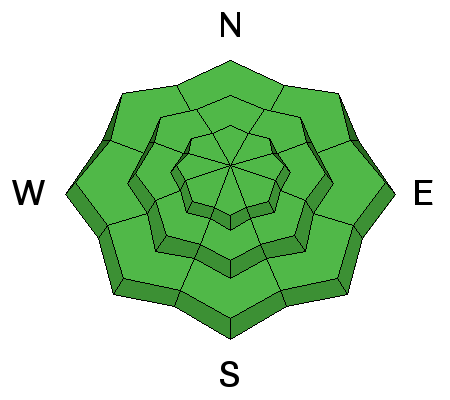25th Annual Black Diamond Fall Fundraising Party
Thursday, September 13; 6:00-10:00 PM; Black Diamond Parking Lot

25th Annual Black Diamond Fall Fundraising Party
Thursday, September 13; 6:00-10:00 PM; Black Diamond Parking Lot
| Advisory: Salt Lake Area Mountains | Issued by Mark Staples for Wednesday - April 4, 2018 - 6:04am |
|---|
 |
special announcement Lift tickets for Snowbasin and Powder Mountain remaining. The tickets are discounted almost 50%. Details and order information here. All proceeds from these go towards paying for avalanche forecasting and education! |
 |
current conditions Temperatures this morning are mostly in the upper 20's and low 30's F, a huge change from yesterday when temperatures started in the single digits. Winds have increased since yesterday and are blowing westerly 15-20 mph gusting 30 mph. Gusts at 11,000 feet are up to 50 mph. A few inches of snow that fell Monday rest on mostly hard icy snow. The hard icy snow is as much of a hazard as any avalanche issue. The photo below from Sunset Peak between Alta and Brighton shows wind scour near the top evidenced by the exposed old ski tracks. Some cross loading and wind drifting can be seen lower on the peak. |
 |
recent activity No avalanche activity was reported yesterday. Heads up if you're considering skiing Timpanogos or other peaks further south this spring. The Provo area mountains have a very different and more dangerous snowpack. It's worth reviewing an avalanche cycle that occurred last week in that area. Below is a photo of avalanche debris from one of the slides on Timpanogos (J. Woodruff). |
| type | aspect/elevation | characteristics |
|---|


|


|

LIKELIHOOD
 LIKELY
UNLIKELY
SIZE
 LARGE
SMALL
TREND
 INCREASING DANGER
SAME
DECREASING DANGER
|
|
description
Strong winds Monday night drifted some snow and created some wind slabs. These are not very deep or very wide. Yesterday on Mt. Tuscarora, I found a few, very small drifts that would crack, see the photo below. You could probably find a few larger ones today. It's hard to say how air temperatures, cloud cover, and sunshine will interact to affect the snow surface today, but clouds should keep sunshine from warming the snow surface too much. Some warming could improve riding conditions. Some warming could also make it easier to trigger very shallow wet loose sluffs. These slides shouldn't be much of a hazard but would be worth watching for. |
 |
weather Today's skies will be mostly cloudy and there is a chance for a couple snowflakes to fall. Temperatures should warm into the mid-30's F and maybe even warmer. Winds will average about 15 mph with 25 mph gusts from the WSW. There is a decent storm brewing. Right now weather models are showing this storm occuring Saturday afternoon into Sunday morning. Snow levels for that storm should start near 9000 feet. It is a fast moving storm that won't linger over the area very long, but could deliver about an inch of snow water equivalent. It's hard to say how much snow that will be.
|
| general announcements CLICK HERE FOR MORE GENERAL INFO AND FAQ The UAC has new support programs with Outdoor Research and Darn Tough. Support the UAC through your daily shopping. When you shop at Smith's, or online at Outdoor Research, REI, Backcountry.com, Darn Tough, Patagonia, NRS, Amazon, eBay a portion of your purchase will be donated to the FUAC. See our Donate Page for more details on how you can support the UAC when you shop. Benefit the Utah Avalanche Center when you buy or sell on eBay - set the Utah Avalanche Center as a favorite non-profit in your eBay account here and click on eBay gives when you buy or sell. You can choose to have your seller fees donated to the UAC, which doesn't cost you a penny This information does not apply to developed ski areas or highways where avalanche control is normally done. This advisory is from the U.S.D.A. Forest Service, which is solely responsible for its content. This advisory describes general avalanche conditions and local variations always occur. |